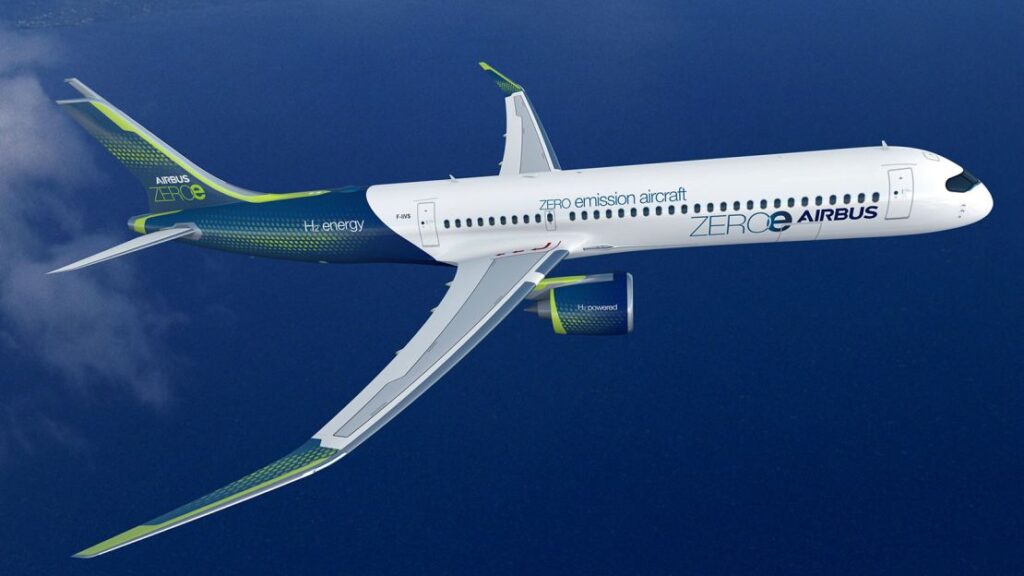Industria e aviacionit ndodhet në prag të një transformimi revolucionar — një ndryshim që mund të ripërcaktojë udhëtimin ajror përgjithmonë. Airbus, një nga prodhuesit më të mëdhenj të avionëve në botë, po hedh një hap të guximshëm drejt së ardhmes me projektin e tij novator ZEROe. Kjo nismë ambicioze synon të sjellë avionin e parë komercial në botë të fuqizuar nga hidrogjeni deri në vitin 2035, duke shënuar fillimin e fundit të avionëve tradicionalë që përdorin lëndë djegëse fosile.
Nevoja për ndryshim
Aviacioni komercial kontribuon rreth 2–3% të emetimeve globale të CO₂, një shifër që pritet të rritet me shtimin e kërkesës për udhëtime ajrore në mbarë botën. Me presionin në rritje nga organizatat mjedisore, qeveritë dhe udhëtarët e ndërgjegjshëm për klimën, industria ka nevojë urgjente për alternativa më të pastra dhe më të gjelbra. Hidrogjeni, i konsideruar prej kohësh si një bartës premtues energjie, po shfaqet tani si një rrugë reale drejt dekarbonizimit të aviacionit.
Prezantimi i Airbus ZEROe
ZEROe nuk është thjesht një avion i vetëm — është një seri konceptesh që përfshin disa dizajne studimore, secili duke paraqitur një vizion të ndryshëm të shtytjes me hidrogjen në aviacion. Airbus prezantoi tre koncepte kryesore ZEROe në vitin 2020:
- Turboprop: I projektuar për fluturime të shkurtra, ky avion ka një dizajn elegant me helikë, i fuqizuar nga djegia e hidrogjenit përmes motorëve të modifikuar me turbinë gazi. Ai mund të transportojë deri në 100 pasagjerë dhe të fluturojë rreth 1,000 milje detare.
- Turbofan: Me pamje më tradicionale, ky avion është i përshtatshëm për fluturime me distancë të mesme dhe mund të mbajë deri në 200 pasagjerë. Hidrogjeni ruhet në depozita të vendosura pas ndarjes së presionit të pasëm dhe rrezja e fluturimit parashikohet të jetë mbi 2,000 milje detare.
- Blended-Wing Body (BWB): Koncepti më futurist, ku krahët dhe trupi bashkohen në një strukturë të vetme të gjerë. Ky dizajn lejon efikasitet më të madh aerodinamik dhe hapësira të reja për ruajtje, duke ofruar potencial për fluturime më të gjata dhe kapacitet më të madh pasagjerësh.
Avantazhet e hidrogjenit
Hidrogjeni ofron disa përparësi thelbësore krahasuar me karburantin tradicional të avionëve:
- Zero emetime CO₂: Kur përdoret në qeliza karburanti, hidrogjeni lëshon vetëm avull uji.
- Efikasitet i lartë energjetik: Qelizat e karburantit me hidrogjen janë deri në tre herë më efikase se motorët me djegie të brendshme.
- Reduktim i zhurmës: Avionët me hidrogjen mund të jenë ndjeshëm më të qetë, duke rritur rehatinë e pasagjerëve dhe duke ulur ndotjen akustike pranë aeroporteve.
Megjithatë, kalimi drejt aviacionit me hidrogjen nuk është pa sfida. Ruajtja e sigurt e hidrogjenit, veçanërisht në formë të lëngshme në temperatura kriogjenike, kërkon dizajne të reja avionësh dhe infrastrukturë të re furnizimi në aeroporte. Airbus i ka pranuar këto vështirësi, por beson se investimi i hershëm dhe inovacioni do të hapin rrugën për zbatimin e suksesshëm.
Një revolucion përtej avionëve
ZEROe nuk ka të bëjë vetëm me ndërtimin e një avioni të ri — ai synon transformimin e një ekosistemi të tërë. Airbus po bashkëpunon ngushtë me prodhues motorësh, operatorë aeroportesh, kompani energjetike dhe politikëbërës për të zhvilluar infrastrukturën e nevojshme për prodhimin, ruajtjen dhe shpërndarjen e hidrogjenit të gjelbër në shkallë të gjerë. Vende si Franca, Gjermania dhe Holanda tashmë po investojnë ndjeshëm në qendra hidrogjeni që do të mbështesin këtë të ardhme.
Për më tepër, angazhimi i Airbus ka ringjallur interesin në të gjithë industrinë. Boeing, Rolls-Royce dhe disa startup-e po eksplorojnë gjithashtu shtytjen me hidrogjen, duke sinjalizuar një lëvizje më të gjerë drejt qiellit më të pastër.
Çfarë do të thotë kjo për pasagjerët
Deri në vitin 2035, hipja në një avion mund të ndihet krejtësisht ndryshe. Fluturimet mund të jenë më të qeta, më të buta dhe shumë më të pastra se kurrë më parë. Me avionët e fuqizuar nga hidrogjeni, fluturimi pa ndjenjë faji mund të bëhet realitet — pa kompromis mes lëvizshmërisë globale dhe përgjegjësisë klimatike.
Projekti ZEROe i Airbus sinjalizon agimin e një epoke të re në aviacion. Nëse ka sukses, ai jo vetëm që do të ripërcaktojë dizajnin e avionëve, por edhe do të përshpejtojë dekarbonizimin e një prej industrive më të vështira për t’u neutralizuar ndaj karbonit. Qielli i së nesërmes mund të mbushet me avionë elegantë dhe jashtëzakonisht të qetë me hidrogjen, duke paralajmëruar një të ardhme më të pastër dhe më të qëndrueshme për udhëtimet ajrore globale.
Po, është koha t’i themi lamtumirë avionëve ashtu siç i njohim sot. Epoka e fluturimit me hidrogjen po vjen — dhe Airbus është i vendosur të udhëheqë këtë rrugë.




